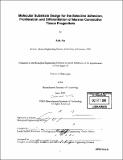Molecular substrate design for the selective adhesion, proliferation and differentiation of marrow connective tissue progenitors
Author(s)
Au, Ada
DownloadFull printable version (9.520Mb)
Other Contributors
Massachusetts Institute of Technology. Biological Engineering Division.
Advisor
Linda Griffith.
Terms of use
Metadata
Show full item recordAbstract
A multi-faceted approach was applied to the molecular design of substrates for the selective adhesion, proliferation and differentiation of connective tissue progenitors (CTPs) from human bone marrow aspirates. The basic premise of the thesis is that integrin-specific adhesion peptides, when presented in a biophysically appropriate spatial arrangement against an inert background, allow enrichment of CTPs in vitro. Comb copolymer comprising a methyl methacrylate backbone with 10-mer poly(oxyethylene) sidechains was selected as the vehicle to present small adhesion peptides at the surface. This polymer shows excellent performance in cell resistance studies and offers sufficient functionalizable sites to create high local densities of ligands. Methods for preparing comb copolymer substrates with peptides in [approx.] 300 nm² clusters with inter-ligand spacings closer than integrins were developed. This nanometer-scale clustered presentation was favorable to integrin binding. Cells were more spread on RGD peptide substrates with a higher degree of nanoscale clustering but of the same overall peptide surface density as comparable substrates with lower degree of peptide clustering. We evaluated adhesion peptides for their ability to support CFU formation of marrow-derived CTPs using colony forming unit (CFU) assay. (cont.) The results, analyzed with a statistical model implemented to capture characteristics of CFU assay, showed that while RGD substrates supported a moderate amount of alkaline phosphatase -positive CFU (CFU-AP) formation, the bone sialoprotein peptide FHRRII(A, and two [alpha]4 [beta]1 peptides demonstrated the best performance in promoting CFU-AP formation. Patient variability in CFU data could be partially explained by the variations in marrow aspirate cell integrin expression, particularly [alpha]5 and [alpha]v [beta]3. The high level of ECM protein association seen with aspirate cells, as revealed by immunoblotting, may inhibit cell adhesion and account for the fairly low CFU counts observed. Treatments of marrow aspirate with phosphate saline buffer (PBS) and RGD solution reduced a significant amount of protein association. A comprehensive study showed that patients' marrow aspirates were naturally partitioned into two groups of very different colony formation behavior and integrin and AP expressions but consistency was observed within each group. Upon treatment of marrow cells with divalent ion-free PBS, CFU-AP formation on RGD substrates drastically increased in one group of patients. The designs and assays developed in this thesis could be applied for the further understanding of marrow aspirates, such as their interaction with a high-affinity [alpha]5 [beta]1 peptide, and with that knowledge, further optimize the surface design of bone marrow grafts.
Description
Thesis (Ph. D.)--Massachusetts Institute of Technology, Biological Engineering Division, 2005. Includes bibliographical references.
Date issued
2005Department
Massachusetts Institute of Technology. Department of Biological EngineeringPublisher
Massachusetts Institute of Technology
Keywords
Biological Engineering Division.